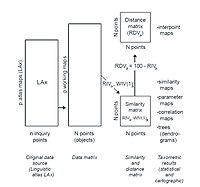Dialectometry

Dialectometry is a fancy word that means studying the differences in the way people talk in different places. Imagine that you and your friend both speak English, but your friend lives in a different city. Even though you both speak the same language, you might use different words, have different accents, and even have different ways of saying things. Dialectometry is like a superpower that helps us study and understand those differences.
Scientists who study dialectometry use special computer algorithms to analyze things like the pronunciation of words, the ways they're used in sentences, and even the way people use grammar. They can use this information to create maps and graphs that show how people talk differently in different places.
For example, they might study how people in Texas say "y'all" versus how people in New York say "you guys." They might also investigate why some people in different places have different accents when they speak the same language.
Dialectometry can be really helpful in understanding the history and culture of different regions. It can also help people who study language and communication better understand the ways people use language to connect with each other.
Scientists who study dialectometry use special computer algorithms to analyze things like the pronunciation of words, the ways they're used in sentences, and even the way people use grammar. They can use this information to create maps and graphs that show how people talk differently in different places.
For example, they might study how people in Texas say "y'all" versus how people in New York say "you guys." They might also investigate why some people in different places have different accents when they speak the same language.
Dialectometry can be really helpful in understanding the history and culture of different regions. It can also help people who study language and communication better understand the ways people use language to connect with each other.
